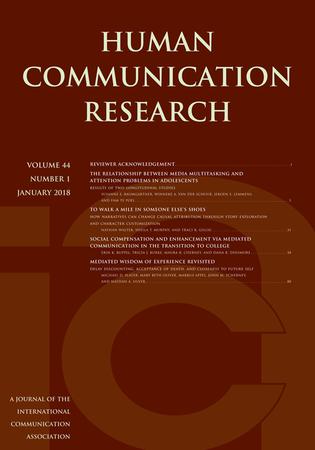Testimonials as motivators: the case of end-of-life conversations
IF 3.3
1区 文学
Q1 COMMUNICATION
引用次数: 0
Abstract
Persuasive testimonials are common in commercial, nonprofit, and public health contexts. They pose challenges to existing theories of narrative persuasion because they are typically both narrative and overtly persuasive. Prior research has suggested testimonials may be effective with counter-attitudinal recipients by decreasing negative affective responses and increasing meaningful affect. Often, however, testimonials may address behaviors that are anxiety provoking rather than counter-attitudinal; prior research provides little theoretical or empirical guidance concerning message influence in the face of such anxiety. An experiment comparing a testimonial versus a non-narrative message advocating end-of-life conversations found that the testimonial message increased behavioral intentions via meaningful affect and self-efficacy. The testimonial did not decrease anxiety, and there was no differential impact on high versus low anxiety recipients. The authors conclude that a eudaimonic testimonial may serve as a motivator of behavior regardless of anxiety concerning the message topic, as well as a means of increasing self-efficacy.作为激励因素的推荐信:临终谈话案例
在商业、非营利和公共卫生领域,劝说性推荐书很常见。它们对现有的叙事说服理论提出了挑战,因为它们通常既是叙事性的,又是公开的说服性的。先前的研究表明,推荐信可以通过减少消极情绪反应和增加有意义的情感,对反态度接受者有效。然而,推荐信往往针对的是引发焦虑的行为,而不是反态度行为;先前的研究几乎没有提供有关面对这种焦虑的信息影响的理论或经验指导。一项实验比较了倡导生命末期对话的推荐信和非叙述性信息,发现推荐信通过有意义的情感和自我效能增加了行为意向。推荐信并没有降低焦虑,对高焦虑和低焦虑的接受者也没有不同的影响。作者的结论是,无论人们对信息主题的焦虑程度如何,优美的推荐信都可以作为一种行为动机,同时也是一种提高自我效能感的手段。
本文章由计算机程序翻译,如有差异,请以英文原文为准。
求助全文
约1分钟内获得全文
求助全文
来源期刊

Human Communication Research
COMMUNICATION-
CiteScore
8.20
自引率
2.00%
发文量
28
期刊介绍:
Human Communication Research is one of the official journals of the prestigious International Communication Association and concentrates on presenting the best empirical work in the area of human communication. It is a top-ranked communication studies journal and one of the top ten journals in the field of human communication. Major topic areas for the journal include language and social interaction, nonverbal communication, interpersonal communication, organizational communication and new technologies, mass communication, health communication, intercultural communication, and developmental issues in communication.
 求助内容:
求助内容: 应助结果提醒方式:
应助结果提醒方式:


